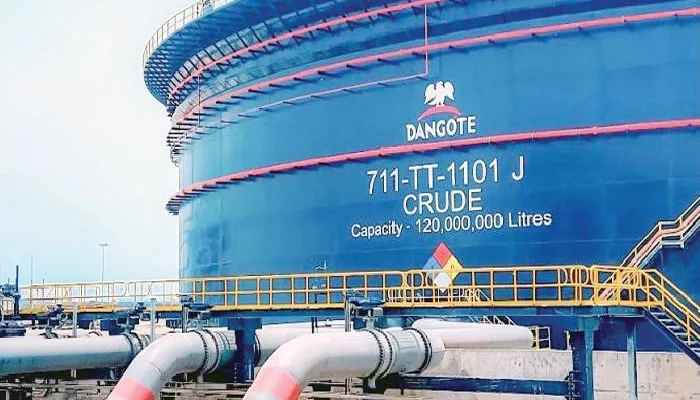Dangote Refinery Takes Lead in Jet Fuel Production
Aviation jet fuel from the Dangote Refinery has come to dominate Nigeria’s supply, accounting for roughly two-thirds of the market.
This development marks a shift in the country’s reliance on imported jet fuel, with imports falling dramatically in the past year.
Join our WhatsApp ChannelThe Lagos-based refinery, which produces 650,000 barrels per day (bpd), has significantly altered Nigeria’s jet fuel landscape, according to a recent report by Energy Intelligence, a US-based oil and gas trends tracker.
Jet Fuel Imports Fall as Dangote Refinery Gains Market Share
According to Energy Intelligence data, Nigeria’s jet fuel imports have fallen sharply, from 13,000 barrels per day (bpd) in 2023 to just 5,000 bpd in 2024. Dangote Refinery’s increasing output is behind this reduction, making the country less dependent on imported fuel. The drop in imports is also reflected in reduced prices for aviation fuel, with costs now $2 to $3 lower per metric ton.
Foluso Sobanjo, Managing Director of Asharami Synergy, highlighted the refinery’s impact on prices: “We’re already buying from Dangote, and it’s slightly cheaper or at least the same price as imports,” Sobanjo told Energy Intelligence.
This shift not only affects Nigeria but also other West African nations. Imports of jet fuel from outside the region have dropped by half, from 34,500 bpd in 2023 to 17,900 bpd in 2024. Dangote’s jet fuel is now being shipped to countries like Benin, Senegal, Togo, The Gambia, and Gabon, further expanding its influence.
Airlines Turn to Dangote Jet Fuel
The dominance of Dangote Refinery in the jet fuel market has been welcomed by key players in Nigeria’s aviation industry. Airline operators are increasingly sourcing their fuel from the refinery. The Minister of Aviation, Festus Keyamo, confirmed this shift, saying, “Airlines are now sourcing jet fuel exclusively from Dangote Refinery, which is a step towards reducing our dependence on imports.”
READ ALSO: Nigeria’s petrol Import declines As Dangote Refinery Boosts Production
Keyamo also explained how this move could benefit the country’s foreign exchange reserves. “Aliko Dangote has always aimed to curb energy imports, which place pressure on Nigeria’s foreign exchange. By sourcing locally, we reduce that pressure significantly,” he said.
Dangote Refinery’s Regional Impact
The refinery’s influence stretches beyond Nigeria’s borders. Since it began exporting jet fuel in March 2024, it has shipped 1.1 million tons (35,000 barrels per day) of jet fuel. This includes 290,000 tons exported to Europe, 315,000 tons to South America, and the remainder mainly distributed across West Africa.
Exports have slowed slightly in recent months, reflecting rising domestic demand. Since April 2024, an additional 94,000 tons of jet fuel from Dangote has been shipped to Nigerian ports, mainly Lagos. Projections suggest this trend will continue as the refinery ramps up its output.
Minister Predicts Price Stability
Minister Keyamo also highlighted the long-term price benefits of sourcing jet fuel locally. A government agreement with Dangote Refinery allows for the purchase of crude oil in naira, which should help stabilise prices.
“We won’t be subjected to the international market fluctuations anymore. We’ll buy in naira, so the cost will be more predictable. This means we can expect cheaper Jet A1 fuel,” he explained.
What Lies Ahead for Dangote Refinery
Dangote Refinery’s management previously indicated that about 75% of its jet fuel would be shipped by sea, while the rest would be distributed inland by road tankers. The current distribution strategy has helped secure the refinery’s dominant market position, now supplying two-thirds of Nigeria’s jet fuel.
As the refinery continues to boost its production, the impact on Nigeria’s economy and the broader West African region is expected to grow. In particular, the reduction in imports will ease the country’s foreign exchange burden while also ensuring a more stable fuel supply for Nigeria’s airlines.
Emmanuel Ochayi is a journalist. He is a graduate of the University of Lagos, School of first choice and the nations pride. Emmanuel is keen on exploring writing angles in different areas, including Business, climate change, politics, Education, and others.


















Follow Us